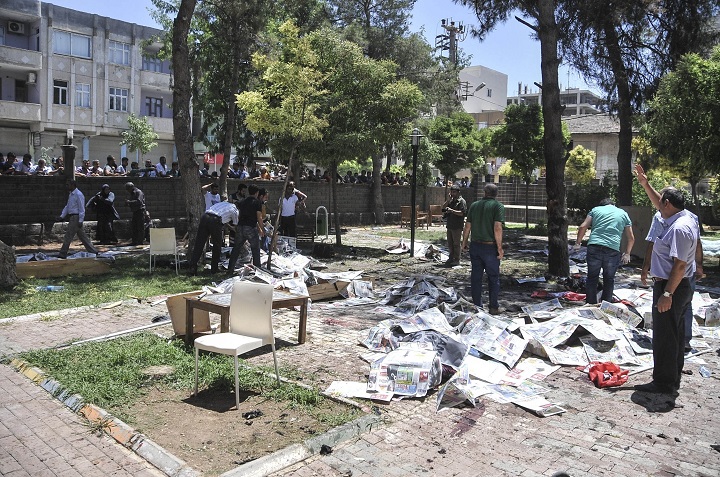ISTANBUL – An explosion rocked the Turkish city of Suruc near the Syrian border on Monday, killing 30 people and wounding nearly 100 others in what Turkish authorities said appeared to be an Islamic State-inspired suicide bombing.

The mid-day explosion took place at a cultural centre in Suruc as a political group, the Federation of Socialist Youths, was wrapping up a news conference on plans to rebuild the Syrian city of Kobani, a witness said.
There was no immediate claim of responsibility but one senior government official told The Associated Press that Turkey suspected the IS group was behind the blast.
Suruc, in southeastern Turkey, is just across the border from Kobani, the scene of fierce battles between Kurdish groups and the Islamic State group. Kobani, populated heavily by Syrian Kurds, was the Islamic State group’s biggest defeat last year since the militants established control over large swathes of Iraq and Syria. Its ruins have become a symbol of Kurdish resistance.
READ MORE: Canada is at war with the Islamic State movement: Harper
If confirmed that IS was behind the attack, it would represent a major expansion of the group’s campaign into Turkey at a time that the Turkish government appears to have stepped up its efforts against the group. The bombing may not have been the group’s first attack in Turkey, but it was the most serious. In January, a female suicide bomber with suspected IS ties blew herself up in a tourist district of Istanbul, killing a police officer and injuring another.
Fatma Edemen, 22, said the federation of about 200 youths had been pressing for more access to help reconstruction in Kobani before the blast.
“One of my friends protected me. First I thought ‘I am dying’ but I was OK. I started to run after I saw the bodies,” she told The AP by phone as she headed to a hospital to get treatment for minor injuries to her legs.
Her voice shaking, she said her group had believed Kobani was relatively safe and ready to rebuild.
“Our friends went there and it didn’t seem dangerous at that time. We couldn’t even think something like that would happen,” she said, adding that they had hoped to build a kindergarten or something else for children in the devastated city.
“We wanted to do something, but they would not let us,” she added.
Kobani was also the scene of surprise IS attacks last month that killed more than 200 people.
Turkish President Recep Tayyip Erdogan, in Cyprus on an official visit, was briefed on the investigation, according to the state-run Anadolu Agency.
“I personally and on behalf of my nation condemn and curse those who perpetrated this savagery,” Erdogan said in a news conference broadcast on Turkish television.
In a statement on Twitter, Turkish Deputy Prime Minister Yalcin Akdogan said “such despicable terrorist attacks on #Turkey’s integrity and peace will never reach their goal.”
The prime minister’s office and the Interior Ministry gave the casualty tolls in a phone call Monday to the AP and in a statement. The senior Turkish official said authorities had evidence that the attack was a suicide bombing. He spoke on condition of anonymity because he was not authorized to speak on the record.
Another explosion went off Monday south of Kobani. One Kurdish official initially described it as a bomb, but Kurdish official Mustafa Bali later said it happened as Kurdish militiamen were removing mortar shells from a dump. Three Kurdish fighters were killed, he said.
Suruc also hosts the largest refugee camp in Turkey, which has seen nearly 2 million Syrians cross its border to flee the fighting.
More than 220,000 Syrians have been killed and at least a million wounded since the country’s crisis began in March 2011, according to the U.N.
Bassem Mroue in Beirut, Lori Hinnant in Paris and Ayse Wieting in Istanbul contributed to this report.



Comments